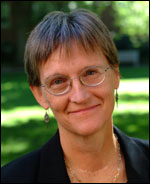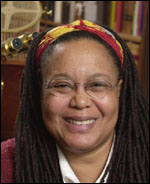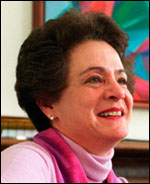Task forces on women established
To focus on women on the faculty and in science and engineering


 Task force leaders include (from left) Drew Gilpin Faust, Evelynn Hammonds, and Barbara Grosz Recent public discussion about women and science has brought renewed attention to long-standing issues concerning the representation of women in the faculty ranks at Harvard and in other top research universities. In response, Harvard President Lawrence H. Summers has announced the establishment of two University-wide task forces to develop concrete proposals to reduce barriers to the advancement of women faculty at Harvard and in academic careers more broadly.
Task force leaders include (from left) Drew Gilpin Faust, Evelynn Hammonds, and Barbara Grosz Recent public discussion about women and science has brought renewed attention to long-standing issues concerning the representation of women in the faculty ranks at Harvard and in other top research universities. In response, Harvard President Lawrence H. Summers has announced the establishment of two University-wide task forces to develop concrete proposals to reduce barriers to the advancement of women faculty at Harvard and in academic careers more broadly.
Membership and Charge to Task Force on Women Faculty
Biographical information
Questions/comments:
Task Force on Women Faculty: wf@harvard.edu
Task Force on Women in Science and Engineering: wise@harvard.edu
“I have long been aware of the many challenges women face in pursuing academic careers, but in the past several weeks the nature and extent of these challenges have been made particularly vivid to me,” said Summers. “It is time for Harvard to step up and affirm in strong and concrete terms its commitment to the advancement and support of women pursuing academic careers. With that in mind, I have asked Drew Faust, dean of the Radcliffe Institute for Advanced Study and Lincoln Professor of History in the Faculty of Arts and Sciences, to join with me and Provost Steven E. Hyman in taking the lead on these efforts.”
Harvard is establishing two University-wide task forces to address different dimensions of the problem.
- The Task Force on Women Faculty will be charged with making recommendations for a series of specific institutional measures – including the creation of a new, senior position at the center of the University – to strengthen the recruitment, support, and advancement of outstanding women faculty in the University.
- The Task Force on Women in Science and Engineering will analyze and make recommendations concerning effective ways to build and sustain the “pipeline” of women pursuing academic careers in science, from undergraduate studies to graduate and postdoctoral work to advancement through faculty ranks.The task forces will coordinate their work closely with respect to faculty issues, with the second task force paying particular attention to the distinctive challenges faced by women faculty in science and engineering fields. For both task forces, the examination of issues relating to women faculty will include attention to the particular challenges and barriers faced by minority women pursuing academic careers.”This is a moment of great opportunity for Harvard,” said Faust. “These task forces will focus on action. They will propose specific measures that can make a significant difference for women at the University. Harvard seeks to lead in every academic and professional field. Our new initiatives are dedicated to making Harvard a leader in advancing the careers of women faculty by offering strong support for their talents and aspirations and eliminating barriers to women’s fullest achievement.”
The task forces will include junior and senior faculty members from across the University, and will be asked to complete their work within this academic year. While careful analysis and thoughtful deliberation will be required to ensure that the University adopts approaches that are effective and durable, it is hoped that the task forces will complete their work by the end of the 2004-05 academic year, and that their recommendations may be considered for implementation in time for the beginning of the 2005-06 academic year, or sooner if practicable.
Task Force on Women Faculty
The Task Force on Women Faculty will be chaired by Evelynn Hammonds, Professor of History of Science and of African and African-American Studies in the Faculty of Arts and Sciences. It will be charged with considering options and examining best practices with respect to the design and implementation of a series of institutional measures, including:
- Creating a senior position in the University’s central administration, presumably to be occupied by a tenured faculty member, that will include as one of its key elements the oversight of new and continuing efforts to enhance gender diversity on the faculty;
- Considering the use of targeted searches as a means of enhancing gender diversity on the faculty;Improving the conduct of searches for senior faculty, junior faculty, and other academic positions;
- Ensuring that women are fully and fairly considered for positions of leadership in the University and for various forms of recognition and honor;
- Enhancing institutional support for faculty members balancing the demands of work and family, including but not limited to child care;
- Exploring such other measures as may enable Harvard to improve its effectiveness in recruiting, retaining, and supporting women faculty.In addition, the Task Force on Women Faculty will be asked to explore means of enhancing the effectiveness of the existing “Outreach Fund,” through which the University has funded $20 million in faculty appointments since 1996 and recently made a new commitment of up to $25 million in additional funds. The Outreach Fund supports the appointment of outstanding scholars from groups that are underrepresented in a department or major subject area within a Faculty or School.
Task Force on Women in Science and Engineering
The Task Force on Women in Science and Engineering will be chaired by Barbara J. Grosz, Higgins Professor of Natural Sciences in the Faculty of Arts and Sciences’ Division of Engineering and Applied Sciences and Dean of Science at the Radcliffe Institute for Advanced Study. It will be asked to analyze and address “pipeline” issues – factors contributing to the underrepresentation of women at various academic career stages in sciences and engineering, including senior faculty and leadership positions. The membership of the task force will be drawn from the Faculties and Schools at Harvard that conduct teaching and research in science and engineering.
The task force will be charged with identifying factors that contribute to the underrepresentation of women at various career stages, identifying successful strategies developed by other institutions or scholars to counter these factors, and tailoring them as necessary to meet Harvard’s specific challenges; formulating new programs and approaches; and, finally, recommending specific actions that the University should take to implement these strategies and track their effectiveness.
Specifically, the task force, operating with the assistance of working groups focused on specific career stages, disciplines, or problems, and chaired by task force members, will aim to accomplish the following:
- Understand factors that affect the decisions of young women, including undergraduates, interested in careers in science and engineering and find effective ways to encourage such aspirations and diminish obstacles to success;
- Understand and address factors in graduate school and in the postdoctoral years that influence professional success – including adequate recognition and support – and affect the decisions of women to pursue academic careers;
- Work with the Task Force on Women Faculty to maximize the chances of success in increasing the numbers of women science faculty at both the junior and senior levels.
- Ensure that women science faculty are fully and fairly considered for positions of leadership in the University and for various forms of recognition and honor;
- Ensure that senior women science faculty have opportunities to participate fully in all large-scale science initiatives, including explicit consideration for leadership roles in all such endeavors undertaken by Harvard or jointly with another institution, and ensure that science initiatives proposed by women are supported equitably; and
- Attend to differences in culture, professional norms, and career paths among the scientific disciplines, departments, and Schools that affect differently the ability of women scientists to succeed in those fields.
Outreach and next steps
The task forces will begin meeting next week and will reach out in a variety of ways to students, faculty, and staff to make sure that their work is informed by the experience and expertise of the wider University community. They will also consider the many prior studies of issues relating to women in academic careers and fields conducted at Harvard and other universities. The task forces welcome communications at wf@harvard.edu (Task Force on Women Faculty) and wise@harvard.edu (Task Force on Women in Science and Engineering).
The task forces are expected to complete their work by May 1, so that recommended measures may be implemented by the beginning of the next academic year. In addition, recommendations will be considered, as appropriate, for immediate implementation as they emerge throughout the spring.




